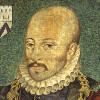“ Nor is a man a coward if he fears insult to his wife and children or envy or anything of the kind; nor brave if he is confident when he is about to be flogged. With what sort of terrible things, then, is the brave man concerned? Surely with the greatest; for no one is more likely than he to stand his ground against what is awe-inspiring. Now death is the most terrible of all things ”
Aristotle, Nicomachean Ethics (c. 334 BC - 330 BC). copy citation
| Author | Aristotle |
|---|---|
| Source | Nicomachean Ethics |
| Topic | death fear |
| Date | c. 334 BC - 330 BC |
| Language | English |
| Reference | |
| Note | Translated by W. D. Ross |
| Weblink | http://classics.mit.edu/Aristotle/nicomachaen.mb.txt |
Context
“But not even the man who is fearless of these is brave. Yet we apply the word to him also in virtue of a similarity; for some who in the dangers of war are cowards are liberal and are confident in face of the loss of money. Nor is a man a coward if he fears insult to his wife and children or envy or anything of the kind; nor brave if he is confident when he is about to be flogged. With what sort of terrible things, then, is the brave man concerned? Surely with the greatest; for no one is more likely than he to stand his ground against what is awe-inspiring. Now death is the most terrible of all things; for it is the end, and nothing is thought to be any longer either good or bad for the dead. But the brave man would not seem to be concerned even with death in all circumstances, e.g. at sea or in disease.”
source


